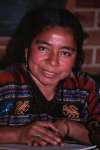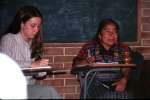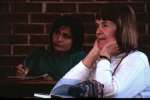|
|
||||
| Prev |
Guatemala 2000 A photo journal by David Booth |
Next | ||
|
|
||||
|
|
||||
| Prev |
Guatemala 2000 A photo journal by David Booth |
Next | ||
|
|
||||
The second day was packed full. After breakfast and a pre-briefing of the day's upcoming events, we began by meeting with Juanita Batzibal of the International Mayan League, who spoke to us about the problems that indigenous populations face in Guatemala.

[Photo by Joanne Ranney] Juanita Batzibal of the International Mayan League |
When the Peace Accords were signed in 1996, I returned to Guatemala, after having been in Costa Rica for 13 years. At that time there was the certainty of the Peace Accords, but the uncertainty of "peace". Peace is not a paper document, but a process that all Guatemalans have to go through, and it's much harder than they had thought. During the war, it was very hard to think about peace in Guatemala and how to prepare for it. Now, it is still hard to have clear ideas of where to go and how.
Many people want to see real change, but they do not realize that the situation in Guatemala is not only caused by 36 years of warfare, but also by the marginalization of indigenous people and their lack of access to resources, that has been going on for centuries. One of the main obstacles to peace is that many Guatemalans still need basic things. And until they can have access to them, they feel hopeless. Three years after the signing of the Peace Accords, there is some desperation and, more than ever, there is a need to reach people and reorganize.
There is now COPMAGUA (Coordinaci˘n de Organizaciones del Pueblo Maya de Guatemala, Coordination of Organizations of the Mayan People of Guatemala), an organization that represents Mayan people in front of the government of Guatemala, and eight other commissions have been created, to prepare new accords regarding the identity of indigenous people and their rights. For example, a really important issue is the recognition of indigenous languages: there are 22 languages, other than Spanish, in Guatemala, but now they are recognized only as dialects. Another fundamental issue is that of education. Guatemala currently has a very racist and alienating system that is destroying the Mayan culture. The educational content is completely against the traditional culture, and many kids are told that "Maya" does not exist, or if it does, it is "backward". As a result, many children are left with the idea that they should "stop being Maya".
COPMAGUA put together a document to present to the government that is based on [cosmovision]: it emphasizes unity from the standpoint of multiculturalism. The starting principle is that all people are united and are the same, without privileged ones. An important goal of the document is the restructuring of the education system to make it more inclusive, creative, innovative, and based on critical and analytical skills. Although this document exists, it has never been accepted or acknowledged. Not even by teachers who would rather keep the education system as it is to avoid putting in more time and effort. The government also thought it would be best not to make any changes to the education system, mostly around election time. But Mayan people want their knowledge to be taught in school: their math, their sciences, their calendar. For too long Mayan culture was undermined by the Spanish one, and it cannot be forgotten that this is one of the main reasons for the conflict.
 Julia (left) takes notes while translating. Some delegates
spoke Spanish, though it was not a requirement for the trip, as the WFP
team leaders did a fine job of translating.
Julia (left) takes notes while translating. Some delegates
spoke Spanish, though it was not a requirement for the trip, as the WFP
team leaders did a fine job of translating.
|
According to one of the three Mayan calendars the Mayan New Year (year 5115) began three days ago. That should have been recognized. An interesting aspect of the calendars is that they tell a person what kind of profession he or she is going to have based on their day of birth. The day of the meeting was the day of the sun, or 4 Axpu (Ax-worker / pu-blow dart), so a person born on this day is one that uses the blow dart, a symbol of strong personality. He or she will be destined to be a warrior, although not a fighter, someone who is a visionary and has the ability to lead people and be an example for them. A person born on the day ts'i (translation unknown) or the day of the perro (dog) is supposed to bring justice, so maybe a lawyer. This should not be interpreted as predetermination, but as a form of guidance; a possibility or a path to follow so that people do not get lost in life. Of course, during the last 500 years, Mayans have forgotten or distanced themselves from many of these traditions, but in doing so they have undermined the delicate balance between people and nature. Such balance is key to Mayan spirituality, another important aspect that COPMAGUA is trying to deal with.
Guatemala has one official religion: catholic, even though almost 80% of Guatemalans are Mayans and wish to express a different religion. Mayans have a different way of expressing spirituality: it is integrated with the secular and scientific life as well. All aspects are a whole, and this is very dangerous for Ladinos, which is why they have tried to suppress Mayan spirituality for centuries. Currently, spiritual activities, although they are not recognized as official, can be publicly performed without being persecuted. Still though, the recognition of sacred places (not churches, but mountains, the land), is still far away. In the past, land was not owned, it was worshipped, but with the Spanish invasion, land was privatized, and so were worship places. The government could enact some regular land reform, but it would not solve the problem, as land would remain private.
One of the eight commissions mentioned earlier is trying to bring about a constitutional reform. This commission has recognized the limitations of Mayans, and how often in the past they have been misinformed by the state. The Guatemalan government is afraid of the political and economical shift that might follow the creation of a new constitutional assembly, and is trying to limit the commission's actions. But that is scary and so is the return to power of Rios Montt. It is very worrisome because he won by a large margin and it just goes to show you that people have very little historical recollection and changes need to happen now before it is too late.
 Delegates Marinetta and Peg
Delegates Marinetta and Peg
|
Besides COPMAGUA, there are other organizations involved, but unfortunately many of them work separately, posing severe limitations on their results. The lack of clarity on specific issues, exacerbated by the lack of political education, is also a severe limitation. Many Guatemalans feel that political participation is just like politics: people changing parties and stands on issues.
The few indigenous representatives that have been able to be elected have very limited power and influence, and if they do they are sent away: there was a Mayan representative who, because of her connection with Rigoberta Menchu, was appointed ambassador and sent to Holland.
Because of all this, the international community has a big role in the peace process, and other governments should remain involved to prevent terrible things from happening again.
A question was raised about the incompatibility of tradition and modernity, and the answer was that tradition is the theoretical and cosmological philosophy of life, and it goes hand in hand with modernity. Customs, it is true, are static, but they are only a part of culture. Traditional knowledge and its glory (in science and math for example) is still very much a viable way of life and not learning from it would be a great loss.
The International Mayan League was born in Costa Rica. Two different groups, one in Costa Rica and one in the US, are working for the League. Their main objectives are to promote and maintain Mayan culture, and to answer the basic questions: "Who am I?", "Where do I come from?" and "Where am I going?"
In the 1980s, there was a lot of talk about death, but now it's time to talk about life instead, and life is expressed through culture. Together the League has published 8 books and it has been working on capacity building and political education. This education must involve seminars about conflict resolution, negotiations and self-esteem, but from a Mayan perspective. The purpose is to heal the wounds of war and improve civil participation in the political process.
[End of meeting notes]